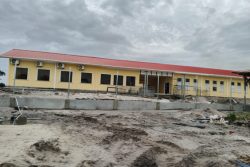As expected, President Hugo Chávez and his United Socialist Party of Venezuela (PSUV) obtained a majority of representatives in the National Assembly in last Sunday’s legislative elections. Mr Chávez himself had made the parliamentary elections a virtual plebiscite on his leadership by earlier announcing that the survival of his ‘Bolivarian revolution’ depended on a two-thirds majority. The result was not, however, the victory that Mr Chávez was seeking, as his party failed to win the two-thirds majority necessary to pass laws unhindered, grant greater powers to the presidency or ram through appointments to the Supreme Court.
The final result credited the PSUV with 97 seats, with the opposition gathered under the umbrella of the Table for Democratic Unity (MUD), a coalition of some 20 parties, winning 65 and returning to the National Assembly for the first time since their ill-considered boycott of the 2005 elections. Smaller parties took the other three seats.
The MUD had initially claimed that it won 52% of the popular vote but was deprived of a majority in the parliament because of electoral gerrymandering that gave greater weight to Chavista strongholds with lower populations. When the final results were made public, however, the National Electoral Council did not endorse this figure, announcing that the PSUV had taken 48.9% of the popular vote as opposed to 47.9% for MUD. This slim victory for President Chávez’s party still does not invalidate the claims of gerrymandering. For example, 20,000 voters elected a PSUV representative in the rural state of Amazonas, whilst 400,000 votes were needed to elect just one MUD representative in the most populated state of Zulia.
Nevertheless, this could well be a political watershed in Venezuela, though the MUD would do well to temper their celebrations. For there have been previous false dawns.
In 2007, Mr Chávez suffered a humiliating defeat in a national referendum on removing presidential term limits. At that time, it was his first defeat in eleven national polls in nine years and it signalled a significant change in the Venezuelan political landscape. Then, in November 2008, the local government elections resulted in the opposition making significant gains in Caracas and the most populous states in the country, amidst claims that Venezuela’s political map had been redrawn.
However, Mr Chávez bounced back with another national referendum on indefinite presidential re-election in February 2009, which he won. In addition, he has proved to be a master of using the advantages of incumbency and all the power of the state at his disposal to frustrate the gains of the opposition, going so far as to strip gubernatorial and mayoral posts held by opposition figures of all resources and effective authority.
Now, as the focus turns to the 2012 presidential election, it will be interesting to see whether Mr Chávez continues with his confrontational and combative style of politics or whether the government and opposition are prepared to find some middle ground in the National Assembly to avoid legislative paralysis. Mr Chávez’s past form and the prospect of the two bitterly opposed and seemingly irreconcilable forces jockeying for position in the build-up to 2012 do not augur well for the political climate in Venezuela.
Mr Chávez, undeterred by the electoral setback, has already announced that “the results are enough to continue deepening the revolution.” In spite of the declining economy, crime rates spiralling out of control and his lower approval ratings, Mr Chávez knows that he is still the single most influential politician in Venezuela, especially as the opposition is yet to present a viable contender.
Last year, Manuel Rosales, who lost to Mr Chávez in the 2006 presidential election, was forced into exile in Peru when the government brought corruption charges against him. Now, the onus will be on the opposition to prove that it can remain united, maintain a coherent and convincing message and offer a viable alternative to the PSUV, in order to oust Mr Chávez at the ballot box. The opposition is therefore expected to maintain its new slogan, “We are the majority,” even as there are fears that the government may try to undermine its gains and boost the president’s power during the last three months of the life of the current parliament. And even when the new National Assembly is convened, many analysts believe that Mr Chávez will try all sorts of tactics to suffocate and frustrate the opposition. Most observers therefore believe that Venezuela is in for a period of heightened political tension, as the embattled government and an emboldened opposition have all to play for between now and the 2012 election.








